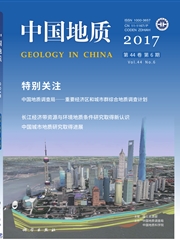

 中文摘要:
中文摘要:
本文主要在岩心观察和描述的基础上,借助于薄片分析、扫描电镜分析和阴极发光分析,通过不同成岩组构的识别及其成岩作用特征分析,结合区域地质背景,恢复珠江口盆地东沙隆起珠江组灰岩经历的成岩环境。结果表明:(1)整体的海侵背景和渐进埋藏过程使得珠江组灰岩中不发育表生成岩作用,但是频繁的海平面变化使得古地貌高部位生长的灰岩受到大气淡水的成岩改造,珠江组灰岩主要经历了海水潜流、大气淡水渗流、大气淡水潜流和埋藏环境等成岩环境;(2)不同成岩环境具有明显不同的成岩组构特征。海水潜流环境的成岩组构主要有广泛发育的藻的包壳作用和藻类-生物的相互包裹、生物钻孔的发育、泥晶化作用、海绿石的形成以及等厚纤维状环边胶结物、颗粒表面的刀刃状或叶片状胶结物、犬牙状胶结物和共轴生长方解石胶结物的发育;淡水潜流环境的主要成岩特征包括粒状亮晶方解石胶结物、棘皮多期共轴加大边和有限的溶解作用;淡水渗流环境中识别的成岩特征有非组构选择性溶解作用、示底构造、微型钟乳状胶结物和新月形胶结物;埋藏成岩环境的成岩作用主要包括压实、压溶作用、晚期溶蚀作用以及油气的侵位。
 英文摘要:
英文摘要:
Based on core description, thin section observation, SEM and cathodoluminescence analysis, combined with regional geological setting, the authors tried to recover the diagenetic environments of limestone in Early Miocene Zhujiang Formation of Pearl River Mouth Basin by identifying the diagenetic fabrics and analyzing the diagenetic characteristics. Some conclusions have been reached: 1) No epigenesis is developed in Zhujiang Formation limestone because of the transgressivebackground and gradual burial history. However, frequent changes in sea level result in the influence of meteoric water on limestone in the high part of the palaeo- geomorphology. The main diagenetic environments developed in Zhujiang Formation limestone include marine phreatic environment, fresh water phreatic environment, fresh water vadose environment and burial diagenetic environment. 2) Marine phreatic environment is the first and foremost environment that the Zhujiang Formation limestone have experienced during the diagenetic process, in which the main diagenesis includes the encrustation of red algae and mutual crusting effect between red algae and other organisms, the development of organism borings, early lithification of micrite and the formation of micrite envelope, glauconite formation, and the cementation of fringing fibrous calcite, bladed spar calcite and syntaxial calcite.Fresh water phreatic environment is characterized by the cementation of equant and massive calcite and mosaic sparry calcite in optical continuity with enclosed echinoderm fragment, and limited solution, while fresh water vadose environment is lack of cementation but has typical features of non- fabric selective solution and geopetal structure. Chemical compaction, development of stylolite, late leaching and oil emplacement are common in the middle to deep burial diagenetic environment.
 同期刊论文项目
同期刊论文项目
 同项目期刊论文
同项目期刊论文
 Geochemical characteristics of the Permian Changxing Formation reef dolomites,northeastern Sichuan B
Geochemical characteristics of the Permian Changxing Formation reef dolomites,northeastern Sichuan B Oxygen and carbon isotopic composition in carbonate rocks of the Permian Qixia Formation, Sichuan Ba
Oxygen and carbon isotopic composition in carbonate rocks of the Permian Qixia Formation, Sichuan Ba The relationship between dolomite textures and their formation temperature: a case study from the Pe
The relationship between dolomite textures and their formation temperature: a case study from the Pe 期刊信息
期刊信息
